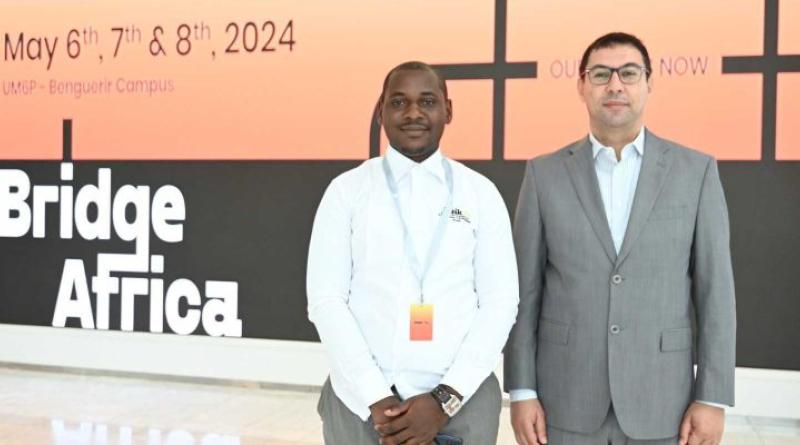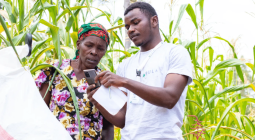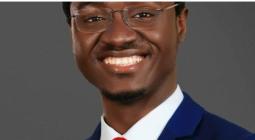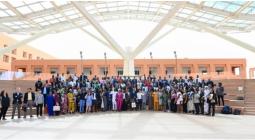Khalid Baddou: “There’s an explosion of innovation just about everywhere in Africa”.

From 6 to 8 May, some 140 young people from all the sub-regions of Africa gathered on the campus of Mohammed VI Polytechnic University (UM6P) to try and find innovative ways of solving the continent's socio-economic, political and environmental challenges. In this interview, we look back at three days of pan-African networking and coaching at the Bridge Africa Summit, led by Khalid Baddou. The Director of Institutional Affairs at UM6P talks about the South-South cooperation championed by Morocco.
From 6 to 8 May, some 140 young people from all the sub-regions of Africa gathered on the campus of Mohammed VI Polytechnic University (UM6P) to try and find innovative ways of solving the continent’s socio-economic, political and environmental challenges. In this interview, we look back at three days of pan-African networking and coaching at the Bridge Africa Summit, led by Khalid Baddou. The Director of Institutional Affairs at UM6P talks about the South-South cooperation championed by Morocco.
Benoit-Ivan Wansi: The Bridge Africa Summit (BAS) organised by the Mohammed VI Polytechnic University (UM6P) was held from 6 to 8 May 2024. Can you tell us about the concept and how it differs from previous initiatives such as Voice of Africa and African Young Leaders?
Khalid Baddou: This event is a continuation of the events organised by UM6P, which aim to confirm our African roots. In fact, this academic institution was founded with the response to African problems, the mobilisation of African youth and the contribution to the economic, social and environmental development of Africa in its DNA. And by virtue of this mission that we have defined for ourselves and that has also been entrusted to us, we have organised several events that meet this objective at different levels. The difference is that the Voice of Africa was organised to make the continent’s voice heard on the sidelines of the Annual Meetings of the World Bank and the International Monetary Fund (IMF), to be hosted by Morocco in October 2023. The conferences and exhibitions showcased African skills and put forward recommendations focusing on innovation, entrepreneurship, food security and the cultural and creative industries.
This was followed by the African Young Leaders concept, which gave rise to the Bridge Africa programme and the Summit of the same name. Central Africa, North Africa, West Africa and Southern Africa are represented.
The main ambition is to provide these young people not only with a forum for communication, networking, sharing and expertise, but also with a platform that gives them the tools and means to realise their projects. And that platform is UM6P. The Bridge Africa Summit, as its name suggests, bridges the gap between a population with projects and aspirations and a Moroccan policy that enables them to realise their dreams.
On what basis were the 140 young African leaders taking part in this event selected, and what concrete results are you expecting?
The selection was based on a system of co-optation at different levels. The first group was co-opted on the basis of recommendations, because they are young people who are active in their respective countries in certain fields. For our part, we chose 18 people who in turn recommended other young people who have the potential to become future leaders of the African continent. This was followed by a call for expressions of interest, which was made public. And of course, this cohort is not static, it will evolve, as some will leave the network because they perhaps don’t fit into the dynamic, while others will join and expand the community over the years.
What we expect from this network is to carry the voice of young Africans. That’s why regional representation is important, because it allows us to listen to all the different capacities. In other words, we’re not just meeting at Ben Guerir, we’re here to create an impact, and that impact won’t stop with the event itself. In other words, this is an annual event, but the Bridge Africa community will live on throughout the year in the different countries represented. Each member must be able to demonstrate their interest by creating a network around them, organising events and setting up projects. We will support them in changing the current narrative about Africa, which is currently perceived as a problem continent. Today, we want to show a continent of opportunities. And there’s no one better than young Africans to help these opportunities emerge.
We noticed that at least 25 African nationalities were represented over the three days. How can we manage to unite 25 different mentalities around a single common objective: sustainable growth in Africa?
That’s the challenge we’ve set ourselves, and it’s one that is constantly being pursued by our School of Collective Intelligence (to be set up in 2019, editor’s note). Nearly 25 mindsets around a common cause obviously encourages these ‘bridgers’ to think about what unites us rather than what separates or differentiates us. Everyone brings their own culture and perspective to the table, but the end result is a collective one. It’s a melting pot that allows something new to crystallise.
Why has Morocco been so interested in a united Africa in recent years, rather than just focusing on its own development? Is the UM6P the voice of the Kingdom of Morocco in relaunching South-South cooperation with the other nations of the continent?
Of course it is. Our initiatives are in line with the Kingdom’s African policy, far removed from any economic, political or social opportunism. Today, Morocco’s future lies in Africa. This was confirmed with its return to the African Union (AU) in 2016, and with the Atlantic initiative, which will give the countries of the Sahel access to the Atlantic. So today, the UM6P is playing its part in bringing young people together, bringing ideas together and creating opportunities, all in line with this strategic vision.
You place a great deal of emphasis on the triptych “Inspire, Involve and Act”. How can this be put into practice in the areas of food security and technology?
Each Bridge Africa participant has his or her own vocation and interests. We bring together experts in different fields so that we can share and exchange ideas, go into a bit more detail, challenge certain ideas and perhaps discover new things that we don’t know about. For example, I recently spoke to a young man who works in carbon farming. This is a major issue for the world, not just Africa. Carbon sequestration is also part of the adaptation to climate change that Africa is facing today, even though it only emits 4% of greenhouse gas emissions. So innovation is the key. And we can see what is currently happening in Nigeria, Kenya, South Africa, Rwanda and other countries where there is an explosion of innovation and creativity on the part of young people, who simply need to be supported and developed.
If you had to relocate an edition of the Bridge Africa Summit (BAS) outside Morocco, which African city would you choose to host it? Which one do you think is dynamic and innovative?
In fact, what we’re going to be asking young people to do is to organise travelling editions of Bridge Africa, as we won’t be meeting in Ben Guerir all the time. The next host cities could be Abuja, Lagos, Douala or Yaoundé, since Nigerians and Cameroonians are fairly well represented in Bridge Africa. However, everything will depend on the appetite of these young people to support this project, to make it their own, to be able to create local circles, and we will be very happy to visit them on site.
On a personal note, you studied at Harvard Business School (HBS), worked for multinationals (Nestlé, Western Union) and then served your country. An ideal and inspiring profile for many young people. What message do you have for the other category of African youth whose future is jeopardised by natural disasters, political instability and ongoing armed conflicts?
The first answer that comes to mind is quite simply to do what you can for yourself, to say to yourself that I can succeed, I can make it. Then it’s about trusting others too. Trust your African neighbours before you go thinking that everything is fine in the West. The first reaction that young Africans have when they walk around UM6P is often to say “you’d never have thought that existed in Africa”. And yet it does exist! My career path is not necessarily linear. I’ve had both setbacks and periods of success. The secret is simply to persevere with determination. Nobody was created to fail in life, so every young person should be able to define a trajectory for themselves and tell themselves that they will succeed and that nothing will stop them from achieving their goals.






